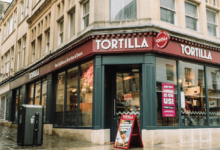The staffing nightmare before Christmas
The effects of Brexit and Covid-19 have been felt over the entirety of the hospitality landscape; with European workers no longer able to come back into the UK and the appetite for the sector starting to improve, the sector may face the most grueling festive season yet when it comes to staffing

The food and drink sector is of “vital importance to the UK economy, according to the trade association, UKHospitality, and no more so than the usual (barring Covid-aside) busy festive period. A latest report from the organisation shows that the sector alone contributes an astounding £120bn to the economy and employs around 13% of the country’s workforce. Yet it may be that we see these numbers declining over the Christmas period. “Our workforce usually sits at around 400 to 450 people at this time of year; we’re currently sitting around 350, to 370,” says Mark Vaughan, people’s director at Beds and Bars. UKHospitality suggests the lack of free movement partnered with Covid-19 has caused ‘chronic labour shortages’ throughout the entirety of the food service landscape.
“The ratio of application per vacancy for the hospitality industry has dropped significantly,” confirms Matthew Moore, managing director at CV-Library. The Office for National Statistics also confirms the suspicions, identifying a total of 134,000 vacancies in the ‘accomodation and food service sector’ between July and September 2021 – almost a 30% increase, increase in comparison to 2019. As the sector prepares for what is broadly considered the most profitable time of the year, it is expected that the catering industry will face the hardship of staffing shortages.
According to the jobs website Indeed, as of 1 October 2021, the proportion of job searches being made for seasonal roles was down 27% in comparison to the same time in 2019, and 33% below its 2018 level. The website also showed 10% of job descriptions described the role as ‘urgent’, reflecting just how much catering companies are struggling to attract staff. “If you wanted to hire a bar team member, it would usually take about 24 hours from advert going out to actual recruitment; on average, it’s now taking between seven to 14 days per team member,” says Vaughan.
So why are applications for this sector so low? Moore claims it is a “combination of things”. He says: “There’s no doubt that Brexit has had an impact, particularly if you look at the figures around net migration.” According to UKHospitality, 1.3 million foreign born workers have had to leave the UK, adding “it is unlikely that they will ever return”.
Moore also stresses how a combination of recent issues has kept the appetite for job moves low. “There are general concerns out there, whether it be the energy crisis, supply chain issues, the shortage of HGV drivers; there is a lack of confidence in certain industries, he says”. CV-Library believes that candidates are still taking caution to “sit tight” in their current positions, with reluctance to move into different sectors. Moore goes as far to say that “there has been a decline in younger people moving into work in general” – the most likely demographic of the population to work in hospitality.
In addition, some believe negative perceptions of working conditions in the food service sector continues to prove an obstacle for catering companies. UKHospitality and Beds and Bars suggests that young people tend to build “misconceptions” of the industry being “low-skilled” and “low paid”, when in actuality it can provide a “broad and diverse” career.
“You can work in the bar for a couple of months and within a year work your way into the marketing team, the HR team, or even the intern management running of your own site,” says Vaughan. “ Sometimes 18 to 22 year olds still see hospitality as somewhere you go for beer money while searching for a different career.”
Moore shares this misconception, suggesting that the “volume of job opportunities” available post-pandemic “naturally” dissuades people from applying for positions within the sector.
So what does this mean for catering companies? According to Beds and Bars, the company’s HR department has had to shift its focus solely onto recruitment, restricting attention that needs to be placed elsewhere. Vaughan explains: “In England alone, we had 93 different nationalities working for our company and it’s already dropped to below 50 different nationalities.”. The firm has consequently had to position additional work onto remaining team members and if necessary would consider ‘reducing opening hours’ may need to be imposed if the staffing shortages worsen. However the operator reassures customers that it will not compromise on standards: “If we see standards showing a potential to drop, we will take action to change hours and alter opening times,” says Vaughan.
It may be that smaller catering companies, in comparison to larger ones, lack the facilities to overcome the effects of staffing shortages. “A lot of the smaller companies are feeling the ‘burn’ rather than the large companies at the moment because we have got a little bit of ‘cushion’ behind us and we’re able to sustain ourselves during this period,” says Vaughan.
“If you look across hospitality as a whole, it doesn’t tend to be a British led job market, especially for the more junior roles – at the moment, we’re asking British people to do jobs that British people traditionally wouldn’t do. The question that now needs answering is, how can the industry incentivise new and remaining staff?
Beds and Bars has implemented a novel scheme for new and remaining employees, set to run throughout the duration of the Christmas period. “From 1 November to the 31 of December, including New Year’s Eve itself, all team members automatically receive a 5% potential bonus from the company,” says Vaughan. He adds: “on top of that, there is between a 10% to 25% bonus based on beating year-on-year targets,” beginning the year before Covid-19. According to Moore, “it’s about showing that culturally, you care for your staff – that you have their long term interests at heart.”
The firm has also disclosed this is specifically for the Christmas period in order to ‘be transparent’ with applicants – “that way you won’t see from our company a mass exit or mass group of people who ‘conveniently’ failed their probation periods,” says Vaughan. The hospitality operator suggested upping wages for the foreseeable future is ‘misleading’ as come January, companies will no longer need the high number of staff recruited in the winter season: “Post Christmas, most hospitality workforces are cut by about 30 to 35%,” Vaughan discloses.
Does the current climate look to change any time soon? According to Moore, “it is difficult to say conclusively.” He adds: “I can’t see anything that will significantly change the pattern that we’re seeing of consistently low applications per job throughout the year – and it’s the case in most industries – there’s no one thing that’s going to change that overnight.”
It is expected that the catering industry will feel unsettled in the build up to Christmas. With Brexit making travel “less accessible” and Covid-19 forcing catering companies to “stretch out staff,” it is quite likely that the festive season will “exacerbate” the problem, and even more so for smaller catering companies, according to Moore. However, CV-Library reassures that “European workers will return”, with companies like Beds and Bars confident the hospitality operator, as well as larger catering companies, will always attract EU workers because they are “safe and secure companies”.
Furthermore, investments in new schemes such as temporary recruitment incentives, may just encourage applicants to choose hospitality over alternative sectors. The company said it is also in the process of launching an additional scheme with the intent to educate people of the career possibilities within hospitality. It seems staffing shortages within the sector have not solely come about by temporary events such as Covid-19 and Brexit; a long standing negative perception of hospitality has repeatedly hindered the appetite to work in the industry. Perhaps if these long-standing barriers facing the sector are also addressed the severity of the staffing nightmare may come to an end.













